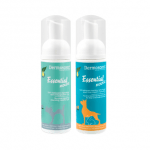
Just like humans, dogs often lose muscle mass and strength as they age. It can be difficult to watch your dog slow down and lose their mobility. Daily activities become more challenging, such as going up and down the stairs, jumping into the car, getting up off the floor, etc. There are many supplements available to nutritionally manage joint and tissue health, but a new dietary supplement is available that exclusively supports muscle health in dogs. MYOS Canine Muscle Formula is the first of its kind and was made originally to improve muscle growth and development in humans. MYOS Canine Muscle Formula supports optimal muscle health and may reduce muscle atrophy and weakness in dogs of all sizes. Beneficial for both aging and active dogs, it encourages better mobility, endurance, and quality of life.
Powered by Fortetropin: “A Revolutionary Ingredient”
Myos Canine Muscle Formula is an all-natural, steroid-free supplement. It contains a single active ingredient, Fortetropin®, which is a bioactive ingredient derived from fertilized chicken egg yolk. It is made using a patented process that preserves the biological integrity and vital nutrients of the yolk. This process includes high-pressure pasteurization and dehydration, which eliminate any harmful pathogens. Fortetropin has been clinically shown to upregulate the muscle-building pathways and downregulate the muscle destruction pathways, resulting in net muscle gain. Fortetropin also contains natural amino acids, vitamins, and minerals from fertilized yolk that support overall health for dogs.
The manufacturer, MYOS Rens Technology, is conducting research on the muscle-promoting abilities of Fortetropin in dogs. A new study at Kansas State University has shown that Fortetropin® helps minimize muscle loss while improving recovery after dogs undergo a common orthopedic surgical procedure. Learn more about this study.
MYOS Canine Muscle Formula News & Reviews
This unique supplement is getting the attention of other dog owners, as well as veterinarians. It was recently featured in articles of the American Veterinarian and Veterinary Practice News, two major clinical news sources for vets. One article describes that this groundbreaking supplement could be a game changer for dogs with dogs with hind end weakness due to degeneration, disk disease, strokes, and arthritis. Read more. We have included a few reviews below so you check out what other dog owners are saying about MYOS Canine Muscle Formula.
“About two months after using MYOS Canine Muscle Formula, Rambo had the leg strength to do the stairs. I would have to assist him prior to this. Now he goes up and down all on his own!”
⭐⭐⭐⭐⭐ Submitted by J.D. ✅ Verified Buyer
“Since taking Fortetropin, Handsome, my 11 year old German Shepherd has more endurance and even my vet noticed a good improvement in him. In the past he was not able to keep up with the puupy, now he can go for a much longer time running.”
⭐⭐⭐⭐⭐ Submitted by Evan ✅ Verified Buyer
VetRxDirect carries MYOS Canine Muscle Formula, in a 6 oz pouch and 12 oz tub. This powdered supplement is mixed with your dog’s regular meal. If you think your dog may be experiencing loss in muscle mass or strength, ask your veterinarian about this new solution.
This information is not intended to diagnose or treat any disease and is purely educational. Please seek advice from your pet’s veterinarian with any questions regarding your pet’s health.



























